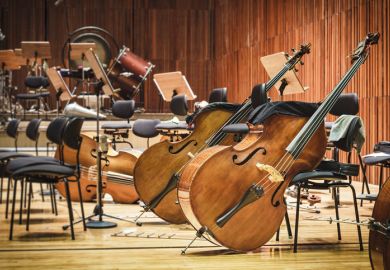“Napoleon is dead; but a new conqueror has already revealed himself to the world; and from Moscow to Naples, from London to Vienna, from Paris to Calcutta, his name is on every tongue. The fame of this hero knows no bounds save that of civilisation itself.”
Thus wrote the French novelist Stendhal in 1824 about the 32-year-old Gioachino Rossini, the foremost opera composer of his day. It was only another 10 years before an opera by Rossini was indeed seen in Calcutta: La Cenerentola, his setting of the Cinderella story, first performed in Rome in 1817.
Although Rossini’s comic masterpiece Il barbiere di Siviglia (1816) was the first work to enter the permanent opera repertory from its inception, most of his 39 operas subsequently fell out of fashion. As a result, the full range and variety of his compositions – which included, besides comedies, classical opera seria, a romantic opera based on Walter Scott, a version of Othello and a biblical drama, all culminating in Guillaume Tell (1829), the greatest of French grand operas – were all but forgotten until the Rossini revival that began in the 1960s.
But Rossini’s operas have still not received the critical attention that they deserve, an omission that this book does much to put right. Emanuele Senici’s approach is not to examine Rossini as some sort of precursor to the composers who followed him, nor to adopt new aesthetic criteria for judging his works, but to look at how they were received in their day in order to understand their phenomenal appeal to contemporaries. And since the composer’s fans included, in addition to Stendhal, the unlikely duo of Hegel and Schopenhauer, that offers some rich pickings. Senici identifies a number of recurrent responses, the most common of which concerned the role played by “repetition” in Rossini’s music. This is found not only in his musical forms (the famous crescendos, with their obsessive-compulsive repetition of a tiny motif), but also in his self-repetition (the zingy overture to Il barbiere had seen previous duty as the prelude to a historical drama on the life and loves of Elizabeth I of England, and before that in a neoclassical opera seria). The repeated hearings of an opera night after night during the season created a particular kind of familiarity for audiences. And Rossini’s music was widely disseminated beyond the opera house: one of the book’s most engaging chapters substantiates the popular dictum that arias from his operas were sung by gondoliers and farm labourers. Repetition becomes a key to understanding Rossini’s particular musical dramaturgy, based not upon mimesis of text or dramatic action, but upon more abstract musical principles.
The book is broken down into a number of short chapters dealing with different aspects of Rossini’s operatic language: imitation, borrowing, noise, theatricality, memory and so on. Senici then draws the threads together, citing Freud on repetition and trauma to suggest that Rossinian repetition spoke to the trauma of the post-Napoleonic generation in Italy: impotent, without a serviceable past or future, hence responsive to “music in the present tense”. Perhaps this wouldn’t explain Rossini’s wider appeal, unless we conclude that all Europe (and beyond) was as traumatically spellbound as the Italians in those years of post-revolutionary clampdown.
Nicholas Till is professor of opera and music theatre at the University of Sussex and Pierre Audi chair in opera and music theatre at the University of Amsterdam.
Music in the Present Tense: Rossini’s Italian Operas in Their Time
By Emanuele Senici
University of Chicago Press, 376pp, £42.00
ISBN 9780226663548
Published 20 December 2019
Register to continue
Why register?
- Registration is free and only takes a moment
- Once registered, you can read 3 articles a month
- Sign up for our newsletter
Subscribe
Or subscribe for unlimited access to:
- Unlimited access to news, views, insights & reviews
- Digital editions
- Digital access to THE’s university and college rankings analysis
Already registered or a current subscriber?








